How to Get a Free Domain Name

Disclosure: This content is reader-supported, which means if you click on some of our links that we may earn a commission.
You need a solid online presence in this day and age. The best way to get this is to start a blog, a website, or an ecommerce store.
But before you can launch any of this, you’ll require a domain name, along with other things like a web host and a website builder.
But what exactly is a domain name?
Do you recognize 74.125.739.116? Probably not.
But I bet you know Google.com.
74.125.739.116 is Google’s numerical IP address, and since remembering such complicated numbers would be difficult, to say the least, domain names were introduced.
A domain name is particularly useful for establishing your brand.
You see, no two domain names can be exactly alike. They can be similar, but never the exact same.
As a result, you get the opportunity to create a distinctive online presence exclusive to you and your business.
What’s more, you don’t have to pay to register your domain! There are several ways you can get a free domain name.
Your 2-Minute Cheat Sheet
Want a quick answer on how to get a free domain name? I’ll cut to the chase.
If you’re planning to start a blog or launch a website, you’ll need a web hosting company. When it comes to making a choice, I suggest you choose Bluehost.

Not only does the company provide excellent speed and uptime reliability, but it also offers free domain names. Moreover, unlike other companies that extend this service only as long as you are their customer, Bluehost won’t take away your domain name.
Here’s what its terms and conditions state:
“If you’re dissatisfied with your experience at Bluehost, you won’t lose your domain name. You’ll be free to transmit or simply point it elsewhere at your convenience. You retain ownership of your domain until the end of its registration period unless you elect to extend it.“
Talk about a company with good ethics.
To create your Bluehost account, click here. The whole process takes about 60 seconds, and you’ll have a web host as well as a free domain.
If this doesn’t appeal to you, you can also consider using a free subdomain.
This is where website builders like WordPress and Wix come into play. The only catch is that instead of having a .com site like mine (NeilPatel.com), you‘ll have something like yourusername.wixsite.com/yoursiteaddress or yourdomainname.wordpress.com.
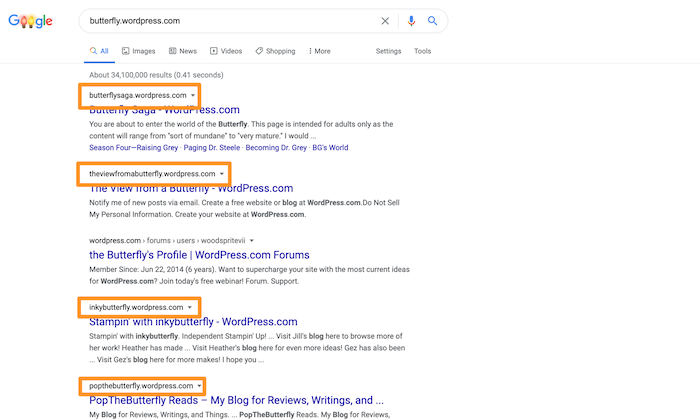
This isn’t an ideal situation. But it can be a viable option for when you want to experiment with free features of the website builder.
And that’s it! Now, if you want to learn how the whole thing works in more detail, read on.
Step 1: Go to Bluehost’s Website
The very first thing you need to do is head over to Bluehost.
Select Hosting from the top menu bar.

You must be wondering why you shouldn’t click on Domains when it’s a free domain that you want. This is because you don’t want to bundle your hosting plan with domain registration.
You’ll end up paying for your domain, which is NOT what we’re aiming for.
Just trust the process.
Step 2: Select Your Hosting Type
Bluehost offers you three types of hosting plans: Shared Hosting, Dedicated Hosting, and VPS Hosting.
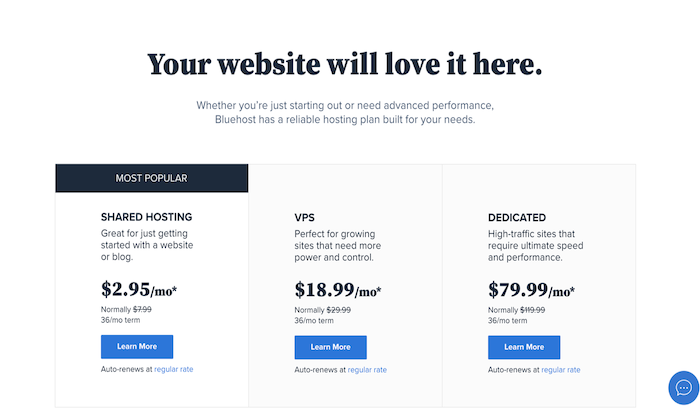
Shared Hosting
I would recommend shared hosting if you’re a newbie just starting out.
Not only are the plans under this category cheap, but they can also accommodate the needs of low-traffic sites quite efficiently.
It allows multiple websites to share the same server resources. This is the main reason why shared hosting is so affordable, but it may also potentially cause slow loading times and performance issues.
This hosting type is good for someone who doesn’t expect high traffic volumes and lacks technical knowledge.
VPS Hosting
VPS hosting stands for virtual private service hosting. This category includes plans for websites that want better performance and can accommodate a higher price point.
The good thing about this hosting type is it guarantees useful resources to you exclusively. Technically, you still share a server with other websites, but you have a “virtual“ server that includes dedicated resources.
You can consider this hosting type if you expect sudden spikes in traffic volumes.
Dedicated Hosting
Dedicated hosting gives you exclusive access to an entire server reserved for your website alone. You don’t have to share it with anyone.
Understandably, you get premium performance with this subscription plan–but you have to be ready to pay its premium price, too.
This could be a good option if you’re a large enterprise that regularly handles high traffic. It’s also great for those who want complete control over the hosting environment.
For this guide, I’ll suggest you choose shared hosting. However, if you prefer other plans, you can go ahead with them as well.
Don’t worry! You get a free domain with any Bluehost plan.
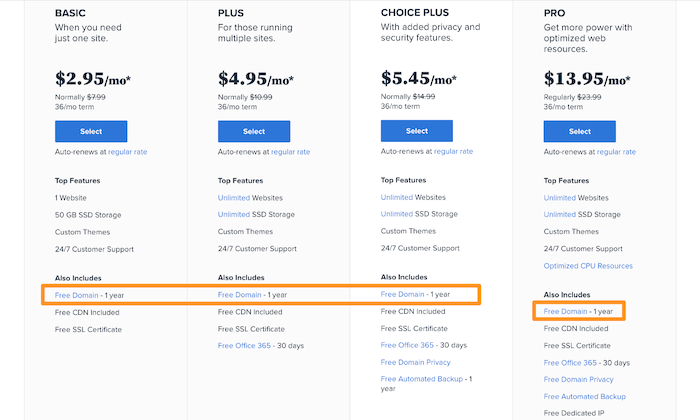
Step 3: Select Your Web Hosting Plan
Bluehost offers four different shared web hosting plans: Basic, Plus, Choice Plus, and Pro.
I’ll suggest opting for the Basic entry-level plan as it’s cheaper and would be better suited to beginners.

It’s very budget-friendly, with plans starting at just $2.95 per month. However, you have to pay three years in advance if you want to get this price. This does sound scary at first, but believe me, it’s worth it.
If you plan on launching a larger site for your business, I would recommend the Choice Plus plan. Although you have to pay more money, the extra features are well worth it.
After that, click on Select under the plan that you decide to proceed with.
Step 4: Register Your Domain
After you choose a subscription plan, Bluehost will ask you to set up your domain.
This is where you’ll get two options:
- Create a new domain
- Use a domain you own
Select the “Create a new domain“ option. This will allow you to search for available domains.
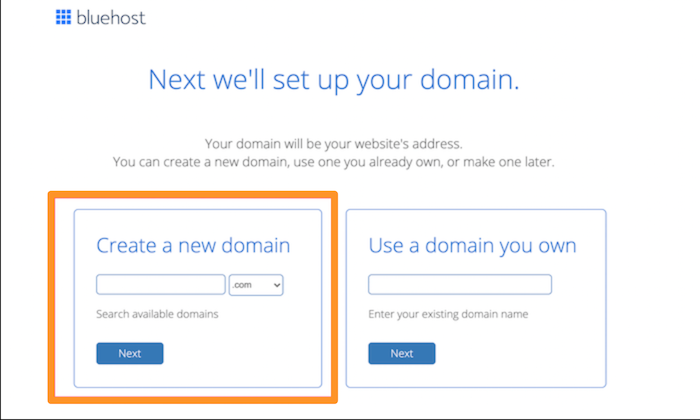
Enter the domain that you want to buy into the search bar and choose your domain extension. Your options include the following:
- .com
- .net
- .blog
- .biz
- .info
- .store
- .co
- .us
… you get the drift.
I’d encourage you to select a .com extension as it looks more professional and helps you appear more reliable to your visitors.
The only time that I’d consider an alternative domain extension is if the .com extension is already taken and you are absolutely set on the name.
The other reason you might consider an alternative domain extension is when the domain is out of your budget. Honestly, there are plenty of extensions cheaper than a .com domain, but sometimes the extra money is worth it.
Otherwise, .com is your best bet.
Having a .com domain is particularly important for businesses—small blogs, personal sites, and side hustles may be able to save a few bucks here.
Step 5: Finalize the Deal
After you’ve chosen an available domain name, all that is left is to create your Bluehost account and finalize your plan terms.
Pay careful attention to the Package Extras section. You don’t need everything you see, but make sure you check the Domain Privacy + Protection option.
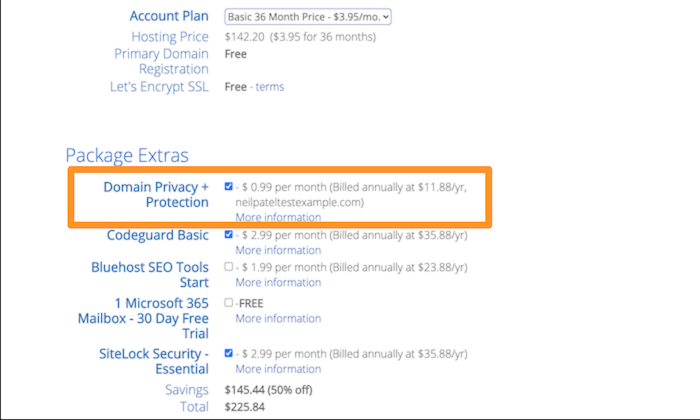
Doing this will conceal your name, email, phone number, and address from appearing on a public database. The $0.99 per month is worth it to keep hackers away if you ask me!
And you’re done!
You now have an excellent hosting plan as well as a free domain. If you have not already started then start now at Bluehost.
Other Methods
For the sake of comprehensiveness, I’ll also discuss two other ways of getting a free domain. Although I don’t recommend them, it’s always good to know all of the options.
Option 1: Using a Free Subdomain
Several website builders offer subdomains, which is a personal domain that exists within an existing domain name.
Remember that movie Inception where Leonardo DiCaprio dreams that he is in a dream? Something similar happens here.
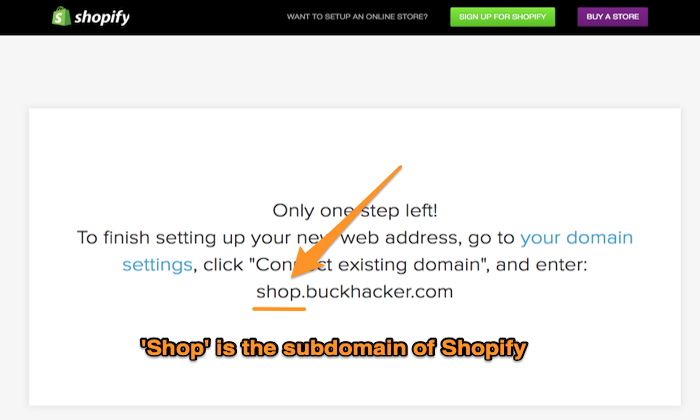
You end up getting a domain name within a domain name.
Site builders like Wix, Squarespace, and Weebly offer subdomains to their users. They have a free trial as well, so if you like their services, you can purchase their premium plans that include everything you require to build, launch, and manage a professional business website.
Out of the several perks on offer like drag-and-drop site builder, web hosting, templates, and search engine optimization (SEO) tools, you also get a free domain name.
But why do I still say this method is not ideal?
Let’s discuss this with an example.
Imagine you use a free website builder like Wix. You won’t have to pay for a domain, yes, but your side will have the Wix subdomain. It’ll look something like this:
yourusername.wixsite.com/yoursiteaddress
Suppose your Wix username is “My Stunning Website 123,” and the domain name you want is myblogsite. Here’s what you’ll get:
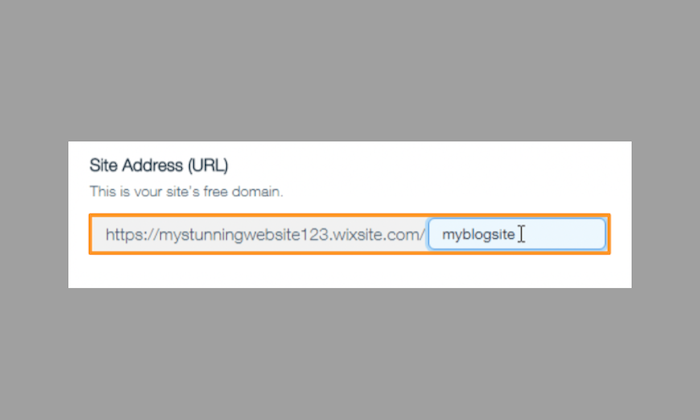
Think about it: Does that look professional? Have you seen any credible website have a domain like this?
That is why I’d only suggest this method if you want to experiment with your website builder’s free features or new updates.
Hostinger and WordPress are your other options, and luckily, neither are as invasive as Wix.
- The format for a free WordPress subdomain is: yourdomainname.wordpress.com
- The format for a free Hostinger subdomain is: example.000webhostapp.com
This is a good option for situations when one cannot spend money, but it is not a viable long-term strategy. You want your domain name to be memorable and short–both of which aren’t possible when you use a subdomain.
The fact that your visitors won’t remember your domain or find it hard to remember is another disadvantage.
Option 2: Using a Free Domain Name Registrar (Not Recommended)
I’m only discussing this option for the sake of comprehensiveness of this article and wouldn’t recommend it.
You can get a domain name from a free domain registrar, but it’s still unsuitable.
You see, the truly free domains use untrustworthy-looking extensions. For instance, you get .tk instead of .com. Your prospective customers would much prefer working with a domain name that reads yourbusiness.com instead of your yourbusiness.tk.
While it is entirely free, it looks unprofessional and untrustworthy and is even susceptible to hackers. Plus, you don’t own the domain name, which also defeats the purpose of launching a blog or a website.
However, if you do decide to take this route, you can check out Freenom, GetFreeDomain.Name and Dot TK.

Several domain registrars will give you a free domain in exchange for running ads on your website. There is nothing wrong with running ads, but this just isn’t the best way to do it.
You don’t have any control over the ads (the kind of ads played, the length, etc.) or their placement. As a result, your visitors may not have the best experience on your website. This may even damage your SEO ranking as well.
In fact, even if you view the situation with a more optimistic viewpoint, it still isn’t viable.
Suppose you’re successful in driving high traffic to your website, and the ads get one million views. You won’t receive a single penny from those ads–all you get is a free domain.
Not a fair trade, right?
If you’re seriously toying with the idea of running ads on your website, I’d advise you to do so through a legitimate advertising network as it can be a great source of income. Don’t exchange ads for a free domain.
Important: Don’t Forget to Renew Your Domain!
Domains expire. This can take one year, two years, or three years based on the package you buy.
Setting up a website or blog is hard work. You put in a lot of effort to find the perfect URL, design a website, and publish relevant content on it, among several other things that help it rank high and attract customers.
Just imagine the horror when you get up and realize some random stranger has bought it. The reason? You forgot to renew your domain.
Tragic.
This is why you must understand the importance of renewing your domain. Many people have made this mistake in the past, and it cost them dearly.
For instance, during one presidential election cycle, Jeb Bush and his team forgot to renew their domain JebBush.com, which Donald Trump successfully purchased and redirected Bush’s visitors to his own presidential election website. It was a stellar business move on Trump’s part, but a disaster that Bush’s team could’ve easily averted.
Make sure domain renewal is marked on your calendar a month in advance. You can also put your domain on auto-renewal just to be safe.
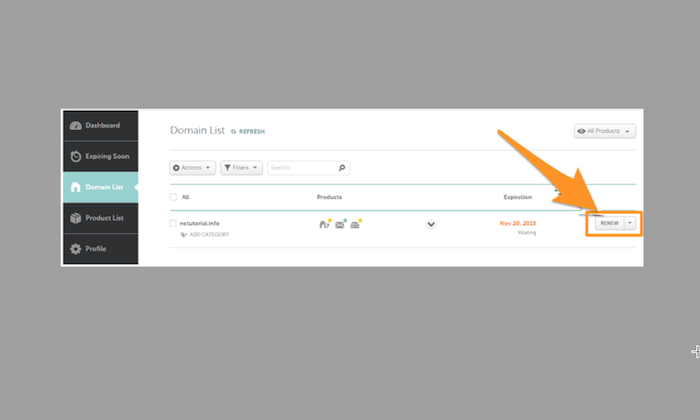
Conclusion
Bluehost is the best way to get a free domain name–one that you won’t have to surrender even if you switch web hosts. The other way is to use a subdomain by using reliable and reputable web builders like WordPress and Wix.
Within seconds you’ll have a reliable web hosting service as well as a new domain for free. Trust me, saving a few dollars isn’t worth the hassle of looking unprofessional, running a spammy website, or getting hacked.
The post How to Get a Free Domain Name appeared first on Neil Patel.
from Neil Patel https://ift.tt/3iHx5yB
No comments